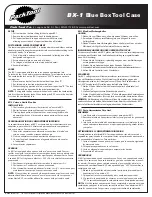
5 – Drive Formatting Instructions
6
OS X® Users’ Instructions
1.
After the Fusion R400 RAID USB 3.0 finishes configuring
the drives, a Disk Insertion window will appear stating that
there is an unreadable volume; click Initialize, and then Disk
Utility will open. Note that if you configured the drives as
JBOD, multiple Disk Insertion windows will open; clicking
Initialize on the first window will cause Disk Utility to
launch.
2.
In the Disk Utility window, RAID 0-, RAID 10-, Span-, and
RAID 5-configured drives will appear as a single volume;
JBOD-configured drives will each appear as a single volume.
Select the volume, and then click the Erase tab at the top of
the window.
3.
Select a drive format and name for the volume, and then
click the Erase button; a window will appear asking you to
approve your choice.
4.
Click Erase; the R400 RAID USB 3.0 volume will appear on
your computer’s desktop.
5.
Repeat steps 2 – 4 as necessary if the drives were JBOD-
configured. Otherwise, close Disk Utility; the R400 RAID
USB 3.0 is ready for use.
Windows® 8/7/Vista and Server 2012/2008 Users’
Instructions
1.
Click the Start button, and then right-click Manage; the
Computer Management window opens.
2.
In the Computer Management window, click Storage on the
left, and then double-click Disk Management.
3.
When the Initialize Disk window appears, select the RAID
volume you created. Select the MBR partition style if you
need to access your RAID storage from a computer running
Windows XP Professional or 32-bit Windows Server 2003;
otherwise, select GPT. Click OK.
4.
In the Disk Management window, the Fusion R400 RAID USB
3.0’s drives will appear (listed as “unallocated”) as a single
volume (unless they were configured as JBOD). Right-click
where the word “unallocated” appears, and then select New
Simple Volume.
5.
When the Welcome to the New Simple Volume Wizard window
appears, click next to start the process.
6.
Follow the remaining steps to complete the process.
Note:
If you do not select the quick format option, this process will take
much longer to complete.
7.
When the Assign Drive Letter or Path window appears, select
Assign the following drive letter, choose a letter, and then
click Next.
8.
When the Format Partition window appears, enter a new
name for the volume table if you’d like. Select Perform a quick
format, and then click Next.
9.
When the next window appears, click Finish.
10.
Repeat steps 4 – 9 as necessary if the drives were JBOD-
configured.
11.
Depending on how you configured the drives, the volume
may already be available to the system. Once the volume has
been formatted and finishes building, the R400 RAID USB
3.0 is ready for use.
Linux Users’ Information
For Linux drive formatting information, please contact your
Linux/Unix vendor.
Содержание Fusion R400
Страница 2: ......
Страница 4: ...This page left intentionally blank ...






























